|
|
|
Sort Order |
|
|
|
Items / Page
|
|
|
|
|
|
|
| Srl | Item |
| 1 |
ID:
174030
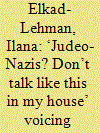

|
|
|
|
|
| Summary/Abstract |
This article demonstrates how experiences of voicing traumas in Israeli society are reflected in art through Ezekiel’s World, a graphic novel by Michael Kovner. The novel explores relations between Holocaust survivors and their children (and grandchildren), whose complexity embodies the moral significance of Holocaust memory for Israelis. Both generations are preoccupied with the Holocaust as an existential crisis that determines contrasting generational attitudes towards military service and the occupation, resulting in the sacrificing of children and conversely, the abandonment of parents. The polyphonic novel voices these interrelated traumas via intertextual relations between painting, narrative, poetry, and documentary.
|
|
|
|
|
|
|
|
|
|
|
|
|
|
|
|
| 2 |
ID:
174034


|
|
|
|
|
| Summary/Abstract |
The article presents narratives of young Bedouin women who attended Jewish schools. An analysis of in-depth interviews conducted with eight young women after they graduated high school and completed academic graduate studies was carried out by examining three mechanisms of choice of identity (Spector-Mersel) through the prism of the unsayable. The findings show a process fraught with representations of personal and social identities, demonstrating differences between their traditional society and the Western society in which they were educated. These point to the strength, security, and autonomy that these students developed, while also reflecting the high cost they had to pay.
|
|
|
|
|
|
|
|
|
|
|
|
|
|
|
|
| 3 |
ID:
174031
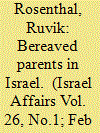

|
|
|
|
|
| Summary/Abstract |
This article explores the changing voice of bereaved parents in Israel from 1948 to the present. Until the early 1980s, bereaved parents did not express their grief or protest publicly. Their bereavement was a strictly private matter. In 1982, shortly after the outbreak of the First Lebanon War, their grief and protest burst into the public sphere. From then on, their voice gained momentum and legitimacy and in time directly impacted the political decision-makers. The article defines four phases in the changing content, tone and style of parental bereavement – hidden, political, privatized, and moral – by analyzing and comparing six representative texts.
|
|
|
|
|
|
|
|
|
|
|
|
|
|
|
|
| 4 |
ID:
174032
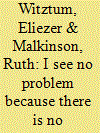

|
|
|
|
|
| Summary/Abstract |
This article discusses denial and silence pertaining to events from the Palestinian Intifada (1987–93) as confronted by medical and mental health professionals. It defines denial from a multidisciplinary perspective comprising psychoanalysis, cognitive psychology, sociology, and medicine, then analyzes personal recollections as well as texts from interviews with psychologists, social workers and psychiatrists. Using the concept of Professional Historical Error, the article shows that some professionals failed to recognise and accept the presence of the Intifada in denying potential mental distress and injuries among soldiers involved in military actions.
|
|
|
|
|
|
|
|
|
|
|
|
|
|
|
|
| 5 |
ID:
174033


|
|
|
|
|
| Summary/Abstract |
This article explores the construction of discursive actions and positioning of adult Israeli Jews who are renouncing their affiliation with religious Judaism and are seeking help in a secular computer-mediated ‘troubles forum’. Adopting the perspective of data-oriented discourse analysis and using content and figurative language analyses, the article shows that all participants, men and women, are performing a forbidden discursive action from the perspective of the religious world when they voice their emotions, thinking about and coping with the complex process of secularisation. It also shows that the participants frequently oscillate between the religious and secular worlds even when they have joined the secular society.
|
|
|
|
|
|
|
|
|
|
|
|
|
|
|
|
| 6 |
ID:
174035
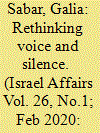

|
|
|
|
|
| Summary/Abstract |
Israeli society is complex, multifaceted, heterogeneous, pluralistic, hectic and loud. Yet, as this volume claims, within this cacophonic arena, islands of silence and pockets of voicelessness remain. Obviously, not all of these could be addressed in this volume, leaving some unexplored: the voices of those suffering from terminal illness, of elders subjected to ageism, of the fat and the disabled, of the LGBT community and of non-Jewish migrants in Israel, to mention but a few that are not commonly heard. This article offers some insights into these unrevealed realities, mainly of those ‘seethrough’ sectors such as labour migrants (usually called foreign workers) and asylum seekers.
|
|
|
|
|
|
|
|
|
|
|
|
|
|
|
|
| 7 |
ID:
174027


|
|
|
|
|
| Summary/Abstract |
This article discusses four types of silencing used by ordinary citizens against Israeli PM Benjamin Netanyahu in comments on his Facebook posts: general silencing in this communication channel aimed at preventing his writing on Facebook; thematic silencing intended to prevent him from speaking on certain issues; metalinguistic silencing aimed at preventing Netanyahu from speaking in certain ways; and meta-pragmatic silencing designed to prevent him from speaking in order to fulfill certain communicational functions.
|
|
|
|
|
|
|
|
|
|
|
|
|
|
|
|
| 8 |
ID:
174026
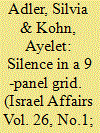

|
|
|
|
|
| Summary/Abstract |
Asaf Hanuka’s autobiographical comic strips collected into one album, The Realist, chronicle everyday episodes in the life of a young Israeli family. The silent nature of many of the panels brings forth the gap between the idea and the praxis. We investigate silence in relation to both genre and Israeliness in order to examine what silence promotes and to what extent it serves the narrative better than sound or words when generating criticism, displaying helplessness, coping with traumatic events, etc. Our six case studies are conducted in the framework of both silence theories and multimodal discourse theories.
|
|
|
|
|
|
|
|
|
|
|
|
|
|
|
|
| 9 |
ID:
174029
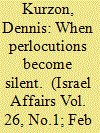

|
|
|
|
|
| Summary/Abstract |
In order to stay in the limelight and be re-elected, politicians depend on their voice to persuade potential voters or party members to support them in general elections or primaries, respectively; their assertions and claims in the form of illocutionary acts also function as perlocutionary acts of persuasion. But when politicians are under criminal investigation, often for corruption in Israel and in other countries, they may silence themselves during police investigation and court hearings, thereby silencing any perlocutionary act that may emerge from their answering questions. This article will examine the case of Naomi Blumenthal, who was found guilty of bribery and obstruction of justice in 2006, and who maintained silence during the police investigation.
|
|
|
|
|
|
|
|
|
|
|
|
|
|
|
|
|
|
|
|
|